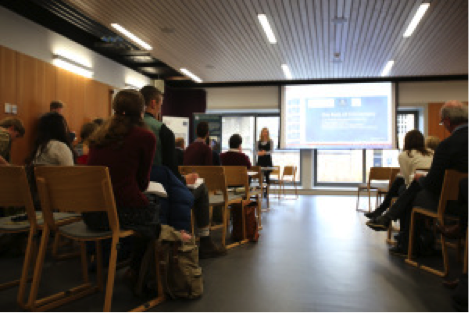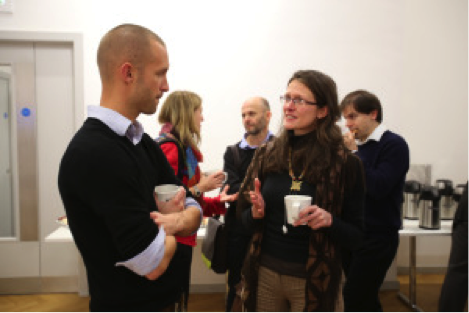The Paris Climate Talks: Politics, Policies and Principles
With funding and support from the Political Studies Association (PSA) the ESRC Festival of Science and the University of Edinburgh’s Global Environment & Society Academy (GESA), the PSA specialist groups on Environmental Politics and French Politics came together in late November to host the forum on the December 2015 Paris climate talks.

20 November 2015, Edinburgh Centre for Carbon Innovation, University of Edinburgh
Known as COP-21 (the 21st Conference of the Parties), the UN conference on climate change taking place in Paris from the 30th November until the 11th December represents the biggest international politics conference of the year, and the greatest re-evaluation of climate ambitions since the Copenhagen summit in 2009. Taking place against the background of the November Paris terror attacks and the resultant requirement for civil society protests at COP21 to remain indoors, the symposium was able to address these ongoing repercussions to highlight the very real link between geopolitical stability and climate stability.
Over 50 participants arrived at the Edinburgh Centre for Carbon Innovation to listen to an exceptional line-up of speakers and to participate in the day’s debates. The opening address from Sarah Boyack MSP and Labour spokesperson for Environmental Justice included a call for those present not to underestimate the role that civil society and academic debate can play in shaping national governments’ agenda. She highlighted the role of individual networks, and solutions-based contributions and the two key contributions those present could make.
Three roundtables, a breakout session for small group discussion and a larger group debate brought the symposium to life. The Forum included ample time for informal discussion and networking, courtesy of GESA coffee provisions and Routledge’s sponsorship of a drinks reception. A full summary is available at:
Political Studies Association website

Short summaries of roundtables and panels
Roundtable 1: French politics in the context of climate change and COP21
This roundtable focused on the political climate in France, but also in Europe and the UK, and how that would impact, and indeed be impacted by, the COP21.
Three themes emerged -
- The importance of hosting the Conference in France on French politics. The success of COP21 could be crucial for the current President, Francois Hollande, and his Parti Socialiste, particularly when considering that 75% of the French population believe that COP21 will be a “major failure”. If Holland and his party come through with promises made and successful CoP he could have a better chance in the next election.
- The power of discourse to frame these issues (the power of the radical right parties). Secondly, the important impact of “climate deniers” or “climate sceptics” on the climate change debate in general and specifically on COP21 was covered by Dr. Startin in his presentation of the Radical Right Parties and their agenda. He noted diversity across countries and parties. The common ground is usually that while they may believe climate change is happening, they do not believe that it is caused by human activity. Sceptics have, over the past week, gained a new field to play out their scepticism, namely security.
- Left vs. right, traditional growth vs. sustainable development. Ladrech pointed out there are huge divides between parties within countries regarding climate change and the environment, and this is particularly reflected in left vs. right parties and whether they push for sustainable development or traditional economic growth. Particularly interesting in France is the focus on nuclear energy as this constitutes 75% of energy production in France because it is low carbon parties can use their support for nuclear as way to say they are addressing emission reduction Reporter: J Fremstadt
Roundtable 2: Governance & Justice Challenges
COP21 can be viewed through two lenses: optimism and pragmatism. These two outlooks are like the lenses of 3D glasses; they show us the same picture, but when viewed outside of context things just don’t quite line up.
Optimistically, international negotiations seem to be learning from the mistakes of Kyoto and Copenhagen with a focus on ‘common but distributed responsibilities’, and have the opportunity to promote justice. Pragmatically, proposed targets aren't ambitious enough to avoid drastic global warming, activism engagement will be low due to the recent Paris attacks, and justice issues may be perceived as an obstacle to action. Perhaps the optimistic and pragmatic lenses will surprise us and align to provide clear positive change as we watch “moments of political theatre”. All the world’s a stage and the UN, nation states, NGOs, and corporations merely players. Despite much of the ‘script’ for Paris having already been written, opportunities for improv are still possible. Reporter: A Spark
Roundtable 3: Civil society
Civil society has a role in highlighting calls for climate justice, from both international and intergenerational perspectives, at the Paris climate talks. This is done by incorporating both alternative technical analyses of the effects of climate change, and by engaging with and presenting powerful emotional aspects to calls for justice.
Civil society groups are often able to create alliances, drawing together different experiences of climate change, for example as a global grassroots movement, Friends of the Earth can incorporate voices from the global South into its analysis, while young campaigners and those from vulnerable island nations have untied over a shared, personal sense of the urgency of addressing climate change.
During the talks, civil society representatives can work to ensure that negotiations and decisions are not made in isolation from the wider public, by ensuring that alternatives to official narratives are released via social and traditional media channels.
Civil society groups are working on creative solutions to ensure that they are still legally and safely represented in Paris, despite the challenges created by the recent terrorist attacks and resulting state of emergency. These events also increase the importance of activities calling for a just climate deal and taking place at local and national levels around the world.
The talks in Paris do not represent the end of civil society’s role in engaging with climate negotiations, holding leaders to account and working to strengthen future commitments to address climate challenges. Reporter: K Milnes
Break-out groups and final plenary panels
Four break-out groups were given the task of identifying and discussing key dynamics and obstacles shaping the Paris CoP and climate change action more generally.
Our panel of ‘experts’ (invited speakers) then re-convened to expand and add to this discussion. Some key themes to emerge from both sessions are as follows:
- State centric, often anthropocentric approach to the issue of climate change generally (and Paris CoP in particular). Groups noted there was little representation of globe as whole, non human life or future generations. Suggested responses ranged from modest to radical steps.
- Neoliberal economic imperative which favours consumption and growth. On one hand groups mentioned that many firms and elements of financial sector are beginning to address climate change as a threat to economic security and stability whereas others insisted much more fundamental re-think was needed to address climate and its impact.
- Security imperative was raised many times. We discussed both how it can be used to stymie representation but also how it can serve as powerful reminder of link between our fossil fuels dependence and its dodgy suppliers.
- Several mentioned the role scientific or professional expertise raises several implications concerning citizen engagement and possible evidence manipulation.
- Media’s role we agreed was fundamental both as ‘shaper’ of our understanding and also as a tool of other actors. Social media also seen as double edged tool which can mobilize and inform but also exploit and constrict information.
- Justice came up as the crucial issue in negotiations and in way we address cc more generally. Justice here refers not just to international dynamic but also intra-national (who should bear burden within states) and inter-generational. The assembled speakers noted again the powerful use of emotion and how we might harness it to achieve aims of climate mitigation, adaptation and justice.
Reporter: E Bomberg

